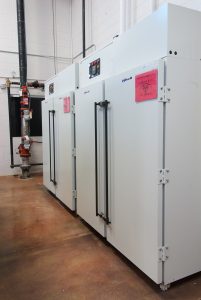The Packaging Department at Nelson Laboratories is often asked by manufacturers “What do I need to do to validate my packaging?” or “What package testing do I need to have performed in order to comply with regulations?” There is not a one-size-fits-all answer to these questions as unique product, packaging, and sterilization combinations require unique testing combinations. However, there are some basic testing concepts that apply to all product and package types: expiry testing; strength, integrity, and microbial barrier testing; and package distribution testing.
 FDA and Accelerated Aging
FDA and Accelerated Aging
FDA requires testing to demonstrate that the packaged product will maintain its integrity and sterility when stored over time, and this testing is required to establish an expiry date. Tests that meet these regulatory requirements are accelerated aging testing, real-time aging testing, or a combination of both. It is important to note that accelerated aging testing does not replace real-time aging testing. In a perfect world with unlimited time and resources, manufacturers would only conduct real time aging tests. However, this type of testing is not practical for manufacturers that need to quickly get their product on the market – they do not have the time to put a package system on the shelf for two or more years and await the results. Because of this, accelerated aging was developed as it meets the testing requirements by FDA.
Accelerated Aging Testing
The concept behind accelerated aging testing: Increasing the temperature escalates the chemical reaction rate of the samples and results in deterioration of materials which simulates artificial aging. Every 10°C increase in temperature doubles the reaction rate. This concept is based on the Arrhenius equation and is explained in further detail in ASTM F1980 Standard Guide for Accelerated Aging of Sterile Barrier System for Medical Devices.
There are limits to this equation, as increasing the temperature too high can prematurely destroy the product/package system. Test temperatures should not exceed 60°C. The temperature used most often in the industry for accelerated aging is 55°C and is the temperature Nelson Labs recommends.
Next Steps
Strength, integrity, and microbial testing verify that the packaging is intact after aging tests. These types of testing are the topics of our next blog post. For more information on real-time or accelerated aging testing, contact your Nelson Labs Account Manager or our Service Center via [email protected] or 801-826-2088.


